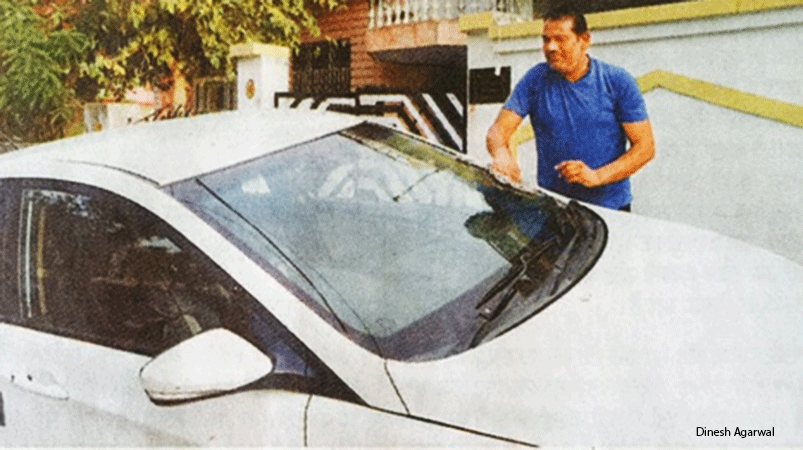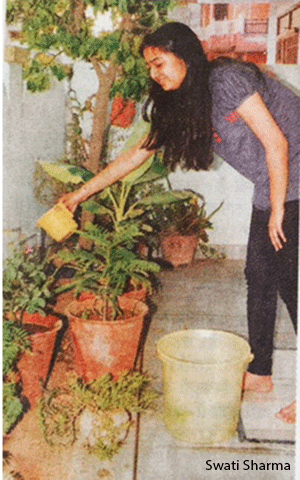Vaishali Nagar in Jaipur turns to a water saving community
As is commonly known as in Hindi, Jal Hai Toh Kal Hai, something we have grown up reading since a very small age. We have read the magazines and newspapers and articles on how to save water, how it’s depleting by every passing year. Even after reading all this, in the end we come down to the act of not following it and not saving water.
We give these things a though only when the summer season begins to show its heat and effect on us. The scarcity of water is known to every human, and its scarcity worsens when the summer season hits the country. Water has already stopped being supplied in taps, as has been reported and the forceful use of dirty and smelly water has also been reported for fresh water has shortage and is just unavailable.
News also flashed that due to water shortage in the city, the grand Indian Premier League (IPL) matches are also not taking place in the city which is a celebrated and enjoyed sport amongst the county and the city people.
Without being told, without being asked to do it, one must save water out of human nature and from the point of sustainability, for we must leave behind fresh and water for the future generations to come.
People of the locality Vaishali Nagar in the city of Jaipur have come to an understanding of saving water religiously. Following just some simple tips by every family has and can lead to water saving in a big number. It has been statistically observed that a family can save up to 10,000 liters of water per day.
Quick facts:
- 60% of the people in Vaishali Nagar have come together to save water.
- Approximately 250 people are residing in a single colony.
- One family can save up to 40 liters of water.
Quick tips from the residents of Vaishali Nagar on how they are saving water:
- Turn off the tap every time you turn it on. Remind yourself to turn its knob off tightly.
- The waste water released from the water purifying system in the homes, commonly known as the RO (Reverse Osmosis) system, such waste water is efficiently used to do the household cleaning and mopping of the floors.
- Excessive water is not splashed and wasted while washing their vehicles.
- Alarms have been installed in the water tanks, to be informed off if the water tank in the home is about to be over-filled.
- Water used to wash the vegetables used in home is re-used to water the plants in the home.
- The tap is not left running off while brushing one’s own teeth. People turn off the tap while they are brushing their teeth and turn it on only to clean and rinse after brushing.
- The leaking taps are paid attention first hand. Leaking taps are repaired to avoid wastage of water drop by drop.
Read some self-tried and habitual practices of the people residing in Vaishali Nagar. Their practices and experiences as they have quoted:
- Water is wasted in a huge amount by washing the vehicles of one’s own home every morning. Every morning people tend to fill up a bucket full of water or take a pipe merely to wash their vehicles. Mr Dinesh Agarwal has not followed this practice of water wastage and instead chose the option of cleaning his vehicles with a damp cloth or a gel based cleaner.

- Washing machines used to wash clothes utilizes a large amount of water for cleaning. Mrs Manju Pareek has made a practice to replace the washing machine and wash clothes by using a bucket full of water instead.
- Swati Sharma, another resident in the locality of Vaishali Nagar, quoted that she utilizes the water from the RO (Reverse Osmosis) system to water the plants in the home. The RO system gives around 4 buckets full of water, out of which only 1 of it is utilized in the home for drinking purposes. Ms Sharma says, she utilizes the remaining water to water the plants and put the excess water in the water cooler system too.

- Ms Chauhan saves water yet again by means of the RO system at home. The waste water from the RO system is used to water the two gardens she has maintained in her home. Apart from watering the plants, she also uses this waste water from the RO in cleaning her home. She says that approximately 8-10 buckets of water are obtained from the RO system when she has guests visiting her home. She does not let water go to waste.
- Mr Atul Sharma says it is not necessary to utilize all the water that is sourced to us. WHO (World Health Organization) states the necessity of 130 liters for every individual every day. One should try to save at least 30 liters of water every day which can lead to the saving of 900 liters of water every month.
Save water, save life.












